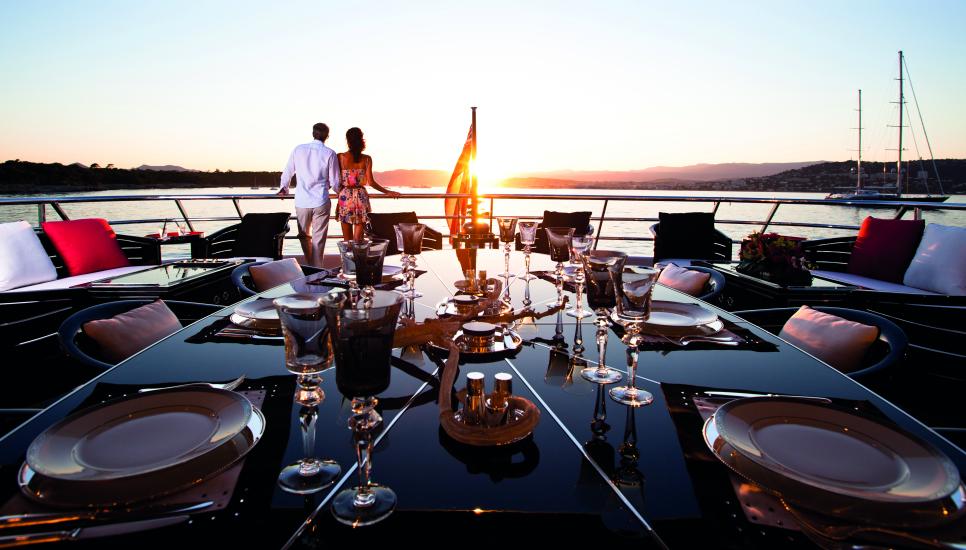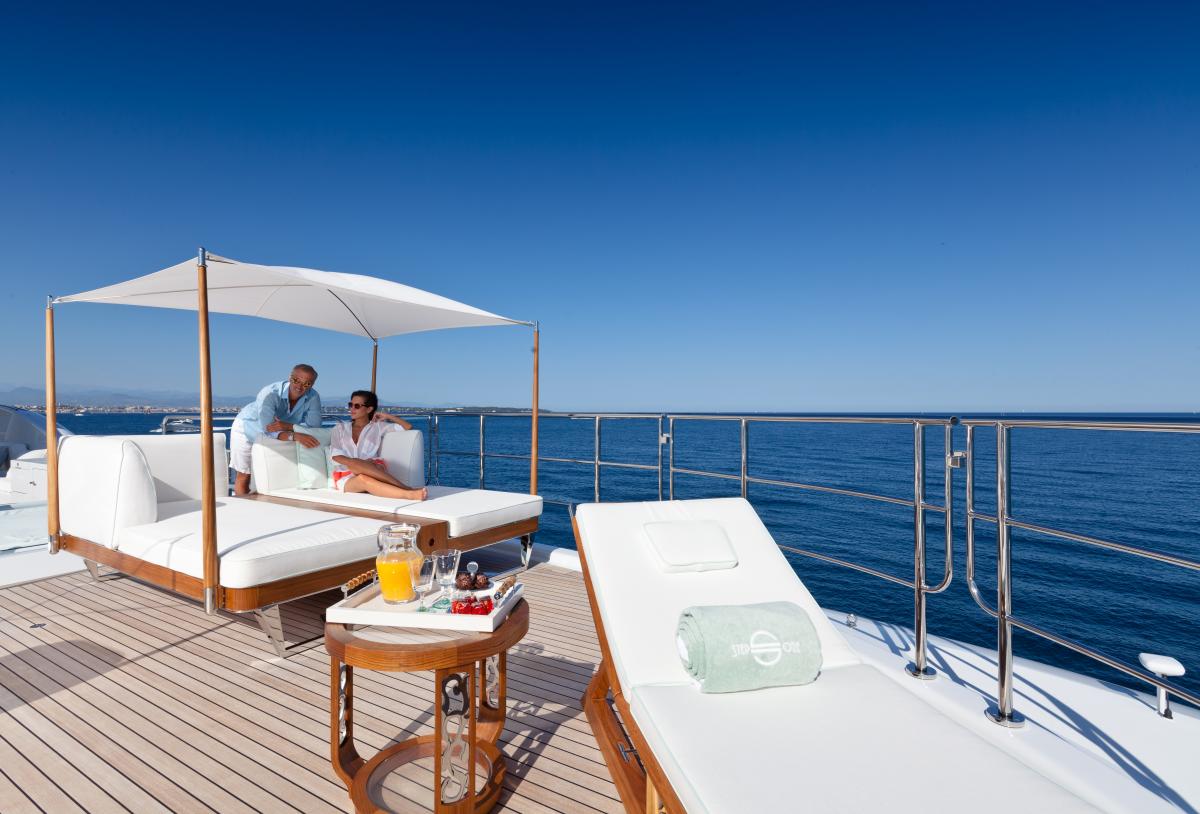All hands on deck: family-owned shipyards

From the outside, few industries look more glossy and alluring than superyacht building. Insiders would shake their heads at such naivété.
“Avoid getting carried away by the glamour, or seduced by the hype,” says one eminent UK consultant. “Some make it - most don't.” In Viareggio, Italian yacht builder Maurizio Balducci agrees: “The boat business is strange. It's not straightforward – it's not like making bread. Sometimes the best commercial strategy is simply not possible.”
Just as special skills are needed to build beautiful yachts, a special corporate skill-set seems to be necessary for yachtbuilders to thrive – especially in today's uncertain global economy. And the skill-set and corporate culture often associated with family ownership seems unusually well suited to such a challenging industry.
Holland may lead the world in superyacht building, but one of its biggest producers, Amels in Vlissingen, is actually just a small part of a much bigger concern. The family-owned Damen Shipyards Group dates back to the 1920s, but the company really took off when Kommer Damen bought it from his father in 1969. Damen came up with a revolutionary modular shipbuilding concept, which streamlined production and lowered costs.
Damen still serves as chairman of the board, while his son Arnout, 45, is chief commercial officer. “We have a family atmosphere,” Arnout says. “Everyone can talk to me. We have low barriers and few managerial privileges.” At the Monaco Yacht Show last September, Arnout did the introductions at a well-attended press conference in which a radical new ice-breaking 'explorer' superyacht was announced by the Amels team.
One of the key advantages of family ownership is freedom. “We have no shareholders to satisfy, so we can focus on a long-term strategy,” Arnout tells me. “All our acquisitions are made from organic growth. We can invest in research. Our main mission is to survive for the next generation. We are here to stay.” Asked if there are any disadvantages, he paused. “Slower growth,” he says, eventually explaining that the key financial relationship is of course not with cash-injecting investors, but with banks. “But it's a choice we make – we don't actually see it as a disadvantage.”
Arnout's sister, Rose Damen, 30, also works in the family firm – in fact she has done since she first drove forklifts around the shipyard during her summer holidays at the age of 16. But she cut her professional teeth outside the company, working in finance in the Far East and in London. “That was fun,” she says. “I liked doing something on my own, and in Singapore and London no-one knows my family name.” As a non-executive member of the Damen board since 2008, along with a brother and sister who work outside the company, the independent-minded Rose joined Damen full-time a year ago.

“Once I decided I wanted to join the firm, I decided to get an MBA – not just so I could better understand the business, but also to boost my own credibility,” she says. “I started as a sales trainee in the Damen headquarters.” We were talking aboard one of the star exhibits at the Monaco Yacht Show, the 60-metre Madame Kate built by Amels, where Rose recently took up a position in sales and marketing.
“Amels is a small company by Damen standards,” she says. “I thought working here would be a good way to learn the business from top to bottom. Also, it's a two-hour drive from the Damen headquarters – and I like there to be a little distance!”
Rose has been quick to grasp the bigger picture. “A family business means planning long-term - we're not just thinking three months ahead. And because we are self-contained we can make quick decisions.” The Damen Group's size is also a benefit, according to Rose. Amels itself may be one of the world's bigger superyacht yards, but its parent company is truly enormous. The Damen Group operates no fewer than 32 shipbuilding and ship-repair yards around the world, and employs over 9,000 people. Products include tugs, ferries, fishing boats, and military vessels as well as the beautiful superyachts constructed at Amels. Annual revenues amount to €2 billion ($2.14 billion).
“The company's diversity is important to our ability to ride out recessions,” says Rose. “When one sector is suffering we always try to transfer workers to other areas within the group, if we can, rather than lay people off.”
A three-hour drive north of the Amels shipyard lies another family-owned superyacht builder, whose reputation lies not with motor yachts but with sail. From the 90-metre, three-masted schooner Athena - described by no less an authority than Yachting World as a “masterpiece” - to the cutting-edge cool of the 57-metre flybridge ketch Twizzle, some of the world's most beautiful and spectacular sailing craft have been launched at the Vollenhove shipyard of Royal Huisman.
Founded way back in 1884, the company has been passed down through five generations. Alice Huisman took over as managing director from her father Wolter in 2003, having already served 24 years with the family firm, starting at age 20, working as her father's secretary to pay back a loan from him. “I was brought up with it,” Alice tells me. “Clients would come home for lunch or dinner. My mother cooked. I had always done school holiday jobs helping around the yard.”
As Wolter Huisman got older, Alice remembers the question of succession becoming more of a worry. “My father was looking for a replacement, but it was not easy,” she recalls. Several senior management appointments were made, but they never quite worked out. “We talked about me taking over, but he was worried that maybe it would be too much - it's a complex company, and very technical. But then he became ill, and says 'why don't you give it a try?'. So I said 'I will'.”
It turned out to be an inspired decision, and some of Royal Huisman's most famous and successful projects were launched during Alice's watch. But it only delayed the inevitable. At the end of last year Alice announced that another Dutch family firm, Royal Doeksen, had acquired a majority shareholding in her family's famous superyacht yard. Her official statement read: “For the first time in five generations there was no family heir of the necessary age and experience to lead a business of this scale to the next stage. My family and I owe it to our forefathers, to our team, and to present and future clients to ensure an orderly succession of this remarkable organisation.”
“It was all about future planning,” Alice tells me at the Monaco show. “We were looking for investment, but also security – times are changing, and we have 350 employees to look after.” She also decided to step down as managing director: “I'm 55,” she explains. “The company has taken its toll, and the business has just become more complicated. I wanted to step back.”
According to Alice, the Royal Huisman forward order book remains strong, while three superyachts were delivered last year and three major new-builds are currently under way in the huge sheds. It last publicly disclosed revenues of more than €50 million in 2012. The refit side of the business also looks healthy, and according to new managing director Roemer Boogaard, 53, who took over from Alice in time for the Monaco Yacht Show, Royal Huisman's new owners are a good fit with the company, with long-time maritime interests and strong family values.
Roemer also agrees with Alice that these are difficult times: “It's a very challenging market,” he says. Taking the long-term view of family firms, he sees trouble ahead for the entire sailboat market: “The motor yacht sector is very dominant at the moment. Are there young customers of the future out there who are passionate enough about sailing?”
It's a question that might not keep Maurizio Balducci awake at night. In Monaco to announce two major new motor yacht projects, the 47-year-old CEO of the Overmarine Group was in a confident mood – although it does not disclose its annual revenues. Best known for its Mangusta brand of fast, luxury power craft, Overmarine was founded in 1985 by his father, an electrical engineer who served numerous shipyards in Viareggio, Italy's teeming yacht-building capital. “He started it as a hobby, and it took off,” Maurizio recalled. “So I left university to join him. I was studying engineering, but I had plenty of experience of summer work in other shipyards.”
Perhaps stronger in Italy than in most other European countries, the culture of family is also strong within the Overmarine Group. “My office door is always open,” Maurizio confirms. “We have a flat management structure. My father, my uncle, and my sister are all involved.” It's a culture which extends downwards. Trading conditions have been punishingly tough for luxury yacht builders since the financial crisis of 2008, but since then Overmarine has remained on an even keel, according to Maurizio, with no layoffs – either among its 125 permanent employees or within its 300-strong legion of subcontractors. “Some of them have worked solely for Overmarine for 25 years,” he says. “We don't renegotiate contracts annually to squeeze costs down – we try to look after them.”
The yachting industry suffered grievously in the financial crisis, and has not recovered to its pre-2008 levels. It may never do so. The companies which survive are those able to follow long-term strategies, with a flexible approach.
“We want to create the best boat for the client,” says Maurizio by way of example. “For many owners the build is part of the fun – so we can't hit them with strict deadlines. We have to be flexible and give them time to make decisions. A family business is not just about numbers.”






